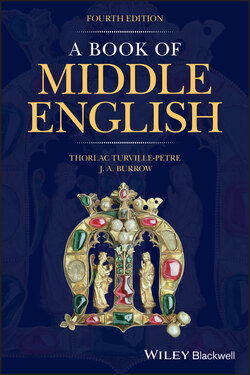Читать книгу A Book of Middle English - J. A. Burrow - Страница 61
5.4.3 Man
ОглавлениеThe indefinite pronoun man causes difficulties on several counts. Firstly it varies in form: man, mon, men, and often the unstressed form me, which in context can sometimes be mistaken for the first person pronoun. Secondly there is no exact equivalent for man in Modern English, for we select from a range of indefinite pronouns to suit the occasion – one, anyone, they, people, we, you – or a passive construction is used instead. All these possibilities must be considered when translating Middle English man; e.g.: me ne chide wit þe gidie, ‘one should not quarrel with fools’ (a proverbial expression), 2/291; riʒt so me grulde schille harpe, ‘just as if a shrill harp were being twanged’, or ‘someone were twanging …’, 2/142; ne isæh nævere na man selere cniht, ‘a better knight was never seen’, 3/28; me hi halt, ‘she is held’, or ‘people think her’, 2/32.
